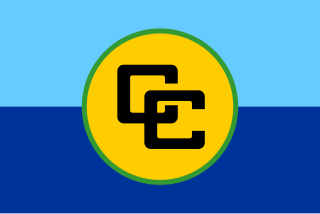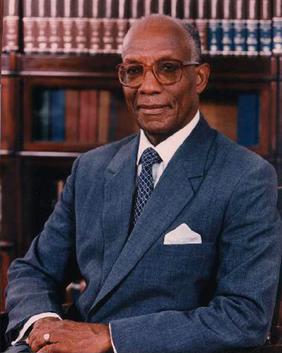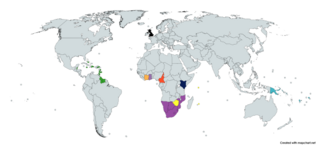Related Research Articles

Barbados is an island country in the Lesser Antilles of the West Indies, in the Caribbean region next to North America and north of South America, and is the most easterly of the Caribbean islands. It lies on the boundary of the South American and the Caribbean Plates. Its capital and largest city is Bridgetown.

The Caribbean Community is an intergovernmental organisation that is a political and economic union of 15 member states and five associated members throughout the Americas, The Caribbean and Atlantic Ocean. It has the primary objective to promote economic integration and cooperation among its members, ensure that the benefits of integration are equitably shared, and coordinate foreign policy. The organisation was established in 1973, by its four founding members signing the Treaty of Chaguaramas. Its primary activities involve:

Sir Clifford Straughn Husbands GCMG KStJ KA QC was a Barbadian judge who served as the sixth Governor-General of Barbados. He held this office from 1996, when he was appointed after the death of Nita Barrow, until he retired on 31 October 2011. He was the longest-serving Barbadian Governor-General.
The honorific prefix "The Most Honourable" is a form of address that is used in several countries. In the United Kingdom, it precedes the name of a marquess or marchioness.

The Cotonou Agreement is a treaty between the European Union and the African, Caribbean and Pacific Group of States. It was signed in June 2000 in Cotonou, Benin's largest city, by 78 ACP countries and the then fifteen Member States of the European Union. It entered into force in 2003 and was subsequently revised in 2005 and 2010.

The Organisation of African, Caribbean and Pacific States is a group of countries in Africa, the Caribbean, and the Pacific that was created by the Georgetown Agreement in 1975. Formerly known as African, Caribbean and Pacific Group of States (ACP), the organisation's main objectives are sustainable development and poverty reduction within its member states, as well as their greater integration into the world's economy. All of the member states, except Cuba, are signatories to the Cotonou Agreement with the European Union.

Although there has been a large degree of integration between European Union member states, foreign relations is still a largely intergovernmental matter, with the 27 states controlling their own relations to a large degree. However, with the Union holding more weight as a single entity, there are at times attempts to speak with one voice, notably on trade and energy matters. The High Representative of the Union for Foreign Affairs and Security Policy personifies this role.

The Parliament of Barbados is the national legislature of Barbados. It is accorded legislative supremacy by Chapter V of the Constitution of Barbados. The Parliament is bicameral in composition and is formally made up of two houses, an appointed Senate and an elected House of Assembly, as well as the President of Barbados who is indirectly elected by both. Both houses sit in separate chambers in the Parliament Buildings, in the national capital Bridgetown in Saint Michael.

The House of Assembly is the legislature of Dominica. It is established by Chapter III of the Constitution of Dominica, and together with the President of Dominica constitutes Dominica's Parliament. The House is unicameral, and consists of twenty-one Representatives, nine senators, and the Attorney General as an ex officio member. The Speaker of the House becomes the thirty-second member if chosen from outside the membership of the House.

The British Windward Islands was an administrative grouping of British colonies in the Windward Islands of the West Indies, existing from 1833 until 31 December 1959 and consisting of the islands of Grenada, Saint Lucia, Saint Vincent, the Grenadines, Barbados, Tobago, and Dominica, previously included in the British Leeward Islands.

Economic Partnership Agreements (EPAs) are a scheme to create a free trade area (FTA) between the European Union and other countries. They are a response to continuing criticism that the non-reciprocal and discriminating preferential trade agreements offered by the EU are incompatible with WTO rules. The EPAs date back to the signing of the Cotonou Agreement. The EPAs with the different regions are at different states of play. The EU has signed EPAs with the following countries: the Southern African Development Community (SADC), ECOWAS, six countries in Eastern and Southern Africa, Cameroon, four Pacific states, and the CARIFORUM states. Their defining characteristic is that they open up exports to the EU immediately, while exports to the partner regions is opened up only partially and over transitioning periods.
The Barbados National Honours and Decorations system is similar to that of the United Kingdom. Likewise, it consists of three types of award – honours, decorations and medals. Appointments are made on a yearly basis on Independence Day by the president of Barbados.

The European Development Fund (EDF) was the main instrument for European Union (EU) aid for development cooperation in Africa, the Caribbean, and Pacific countries and the Overseas Countries and Territories (OCT). Funding was provided by voluntary donations by EU member states. Until 2020 the EDF was subject to its own financial rules and procedures, and was managed by the European Commission (EC) and the European Investment Bank. The EDF has been incorporated into the EU's general budget as of the 2021–2027 multi-annual financial framework.

The ACP–EU Joint Parliamentary Assembly was created to bring together the elected representatives of the European Union and the elected representatives of the African, Caribbean and Pacific states that have signed the Cotonou Agreement.

The Cabinet are individuals of Barbados which execute the duties of the Government of Barbados. Under a Parliamentary republic, these powers are vested nominally by the President of Barbados, but are exercised in practice by a Cabinet of Ministers, presided over by the Prime Minister of Barbados. The Prime Minister is formally appointed by the President: the President must appoint, as Prime Minister, someone who can control a majority of votes in the House of Assembly. In practice, this is normally the leader of the largest political party or coalition in the house. When there is no clear majority, the president assumers the role of arbitrator and opens negotiations with the leaders of the various political parties, in the hope of finding someone whom a majority will accept as Prime Minister. In the event of that failing to take place, the President must dissolve the House of Assembly and call an early election.
Daniel Kuzozvirava Shumba is a former Zimbabwe Army colonel and businessman; he returned to active politics and rose to Masvingo Provincial Chairman and member of the Central Committee [(the highest organ)] of the ZANU-PF political party. He is a son of a founding member of ZANU, and had a strong political background. He underwent Zanla's basic military training at Chisamba, Zambia, in 1978 before continuing with his academics. Shumba's accolades extend to having served in the Special Forces of the Zimbabwe National Army from 1983 to 1989.

This article deals with the diplomatic affairs, foreign policy and international relations of Barbados.
Sir John Montague Stow was a British colonial official who served in various roles.

The State House is the official residence and office of the president of Barbados. It was built in 1702 during the colonial days and served as a Quaker Plantation, until it was purchased by the imperial government, to act as a replacement to the Bagatelle Great House in the Parish of St Thomas.
References
- ↑ BARBADOS CRL Foreign Official Gazette Database, 2014. Retrieved 13 May 2014. Archived here.
- ↑ CO 32 - Colonial Office and successors: Barbados, Government Gazettes, The U.K. National Archives' catalogue